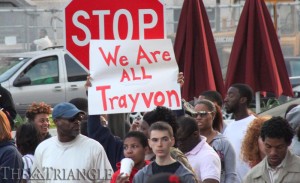The Africana studies program at Drexel collaborated with a counselor from the University of Pennsylvania to host a panel discussion July 27 in the Papadakis Integrated Sciences Building regarding race and equality, following the verdict of the George Zimmerman trial.
Jacqueline Rios, the communications and events coordinator for interdisciplinary programs, and Shesheena Bray, counselor from the University of Pennsylvania, hosted the event, which was cosponsored by the College of Arts and Sciences.
The panel discussion was presented and debated by several well-known promoters for African-American rights in Philadelphia. Some of the noted faces were Anthony Monteiro, distinguished lecturer and associate director of the Institute for the Study of Race and Social Thought at Temple University; Donald Tibbs, associate law professor at Drexel’s Earle Mack School of Law; Gabriel Bryant and Shesheena Bray, activists for Sankofa Community Empowerment; Patrice Armstead, grassroots organizer and co-founder of Building People’s Power; and Paul “S. Frosty” Jackson, a public projects strategist, community organizer and board member of The Rotunda of the University of Pennsylvania.
The discussion started off with a brief overview of the definitions of justice and equality when it came to the life of Trayvon Martin.
“Before we get into the debate of justice and equality for our youth, we have to first define what justice for Trayvon means,” Monteiro said, jump-starting the discussion. “Regardless of the verdict, the elected officials were not going to compromise their political standing. We have to understand that organizations such as the [National Rifle Association] are fueling right-winged Republican parties against what could be a fair trial and decisions for young African-American youth such as Trayvon Martin.”
Throughout the discussion, one of the more probing questions Bray asked was to define a possible outcome of the case, had it been decided differently: “How would the verdict of the case have been different had the charge of manslaughter stuck?”
“One of the unfortunate problems with this case was that the prosecution went about it in a very poor manner,” Tibbs explained. “The prosecution did not have to prove that Zimmerman killed Trayvon; that was obvious. Trayvon was shot in the head by Zimmerman’s gun, … which is evidence and does not have to be reiterated. What they had to prove was that Zimmerman did it with ill will. The prosecution overcharged immediately to second-degree murder and did not give the manslaughter charge placed after a standing chance. If the manslaughter charge had stuck, Zimmerman would … be in jail for a maximum of two years, but still, better than what ended up happening, isn’t it?”
In the duration of the three-hour panel discussion, numerous topics of Trayvon’s untimely death and the verdict of the Zimmerman case were discussed. Toward the end of the panel, however, the floor opened up for a question and answer session. One of the questions that gained the most controversy and outrage was about women’s rights.
A member of the audience brought up the question of women’s rights in Philadelphia, explaining that some African-American women are subject to similar brutality and rape as the city’s youth and questioning why the panel hadn’t addressed the violence against women or suggested a solution to it.
“To me personally, it isn’t about defining what gender is being attacked upon. It is all still violence against African-Americans, and that’s why we are here, to address this violence,” Armstead answered.
Toward the end of the question-and-answer session, the audience members were directed into separate groups, and each discussed possible alternatives and solutions on the topics of justice and race. Aside from a location to express outrage towards the trial’s verdict, the panel discussion promoted a positive way to set aside differences and look for better and more sustainable solutions for African-American communities.
In the process of discussing the Zimmerman verdict, new and upcoming ideas for justice were discussed as well as for the education of Philadelphia’s youth, to prevent such cases from arising in the first place.
“What we have always wanted is change, and [the time for] urgent change [is] now,” Monteiro said.


